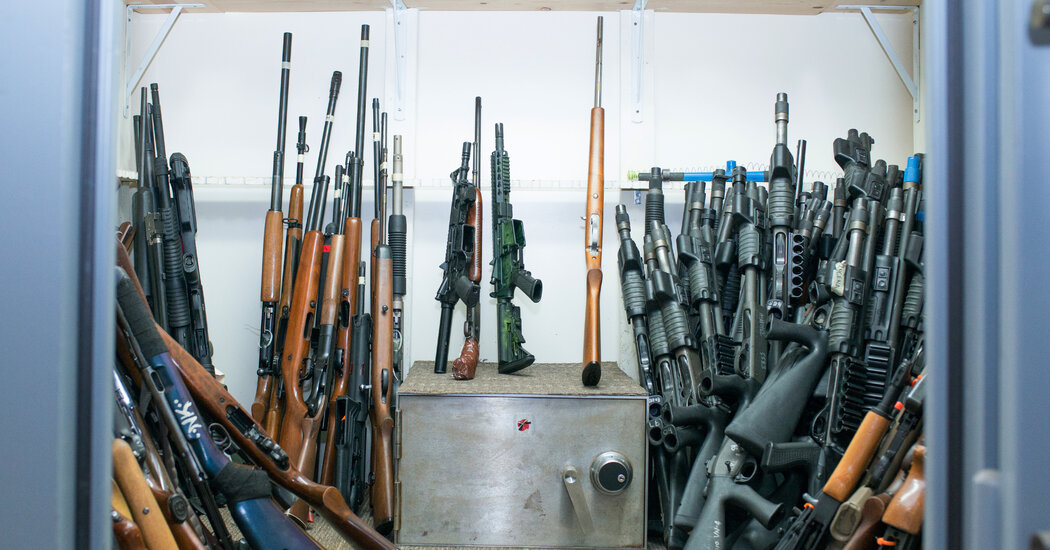Communities across the U.S. are fueling a secondary arms market by giving seized and surrendered guns to disposal services that destroy one part and resell the rest.
When Flint, Mich., announced in September that 68 assault weapons collected in a gun buyback would be incinerated, the city cited its policy of never reselling firearms.
“Gun violence continues to cause enormous grief and trauma,” said Mayor Sheldon Neeley. “I will not allow our city government to profit from our community’s pain by reselling weapons that can be turned against Flint residents.”
But Flint’s guns were not going to be melted down. Instead, they made their way to a private company that has collected millions of dollars taking firearms from police agencies, destroying a single piece of each weapon stamped with the serial number and selling the rest as nearly complete gun kits. Buyers online can easily replace what’s missing and reconstitute the weapon.
Hundreds of towns and cities have turned to a growing industry that offers to destroy guns used in crimes, surrendered in buybacks or replaced by police force upgrades. But these communities are in fact fueling a secondary arms market, where weapons slated for destruction are recycled into civilian hands, often with no background check required, according to interviews and a review of gun disposal contracts, patent records and online listings for firearms parts.



Gun buy backs are a total joke. All you end up buying is a bunch of busted ass guns that nobody wanted. Wish they would have one around here. I could unload a few that I hate, are useless or nonfunctional. Get paid son!
Saw a hilarious picture of an Australian buy back. Those ancient rifles, shotguns and rusted out revolvers were laughable. If you used a photo tool to gather the most common color from that pile, it would be the dark orange guns turn when they rust. Bet not 1 in 10 was functional.
And the idiots in the article were patting themselves on the back for doing such a fine job taking these guns out of circulation! They were so very proud.
Why would you “sell back” actual guns when you can build a functioning 12 gauge shotgun from $20 of parts from the hardware store? Slap a few of those together and turn them in for a solid contribution toward your next gun.
How many mass shootings has Australia had in the past decade, again?
Mandatory confiscation and eliminating new sales =! US gun buybacks where the stores are still open
Kind of a weird position to say that gun buybacks played no part in removing the guns. 🤷♂️
What?
Australia had mandatory confiscation of ALL guns basically, and heavily restricted new sales. No guns, no shootings duh
The US has no such blanket ban, and so these kind of VOLUNTARY buybacks are generally pretty unhelpful for reducing gun crime and/or mass shootings. The buyback may ‘take off the streets’ X number of gun from a community, but if there’s still 5 million NICS background checks for new gun sales each year, then the US buyback are not achieving the stated goal of safer communities. The same money and time could be spent on better programs like Oakland CA is doing currently
deleted by creator
(Not sure if my other comment got deleted successfully or not, so posting this next to it)
Sorry, I reacted to your second sentence without reading the rest. (I am Australian, I was a bit offended by reading “Australia had mandatory confiscation of ALL guns basically”)
In Australia the gun buybacks were followed by decreases in gun violence. It’s debated whether that was because of the gun buybacks or other policies, it’s hard to be certain without two identical countries and A-B testing. Nonetheless: anything that makes guns and gun parts less available is likely to help and doesn’t seem to have much in the way of disadvantages other than money. These days it’s mostly through gun amnesties (not buybacks) so that problem is avoided.